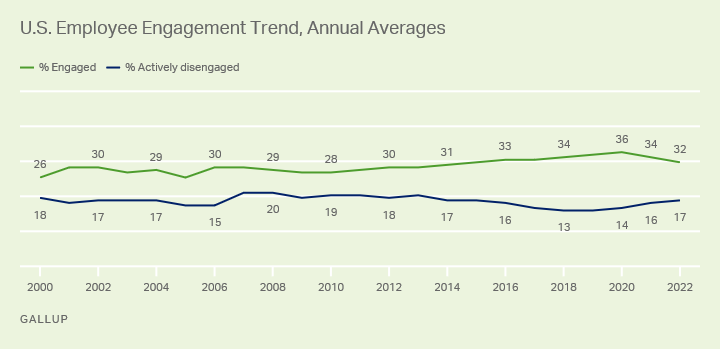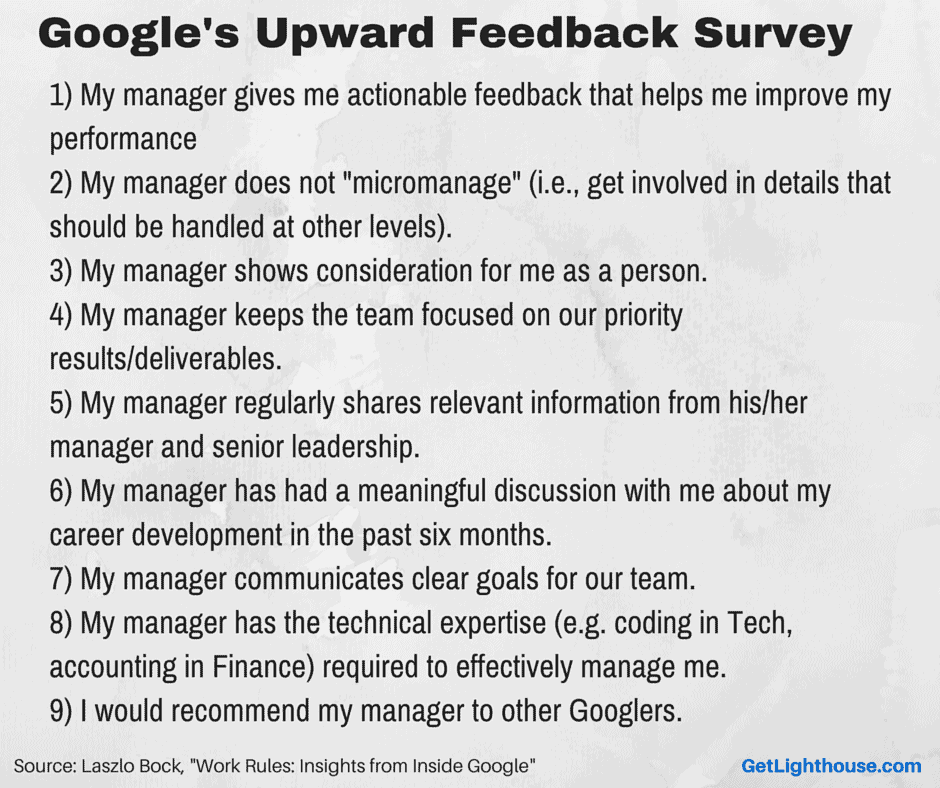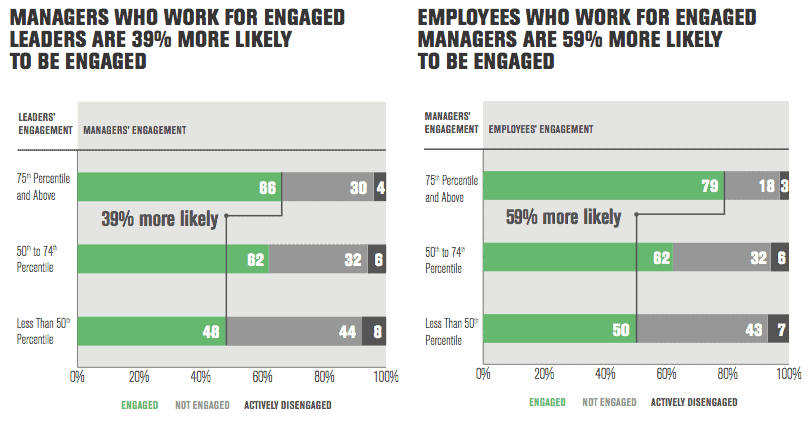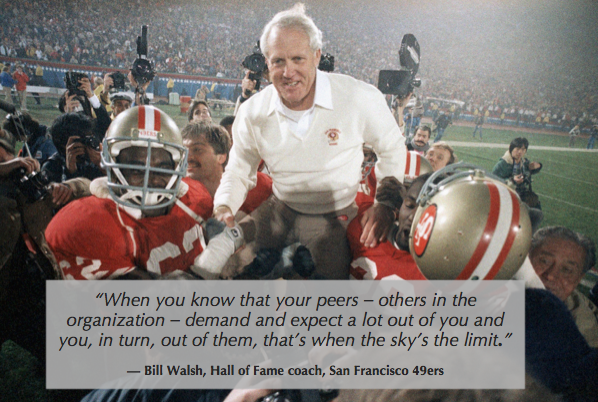Why are there so many bad bosses?
Research from Gallup reveals that over 50% of Americans have quit a job to get away from their manager. Meanwhile, overall employee engagement has been stuck for years around a meager 30%:

And who is responsible for this poor engagement? Gallup's research shows that managers, "account for at least 70% of the variance in employee engagement."
This is a painful indictment of bosses everywhere.
Is there an evil gene creating bad bosses?
Of course not. But it begs the question: How is it that so many managers become bad bosses?
There are a number of factors that hurt even managers with the best intentions as they try to lead their teams. Today we're looking at those factors that contribute to good people becoming bad bosses and what can be done about them.
Table of Contents - Why are there so many bad bosses?
- Reason #1: They're a manager and an individual contributor
- Reason #2: They receive no training
- Reason #3: They are not rewarded for being a good manager
- Reason #4: They are given no support
- Reason #5: They rely on the Carrot & Stick
- Reason #6: They lack self-awareness

Why Good People become Bad Bosses
If your career has been longer than a few years, you're bound to have had at least a couple bad bosses. It would be easy to become bitter and hold it personally against each of them. That would be the easy way, but there is a better way.
Instead, realize there are circumstances that make a manager's job much more difficult. And as you work under them, you will feel many of the negative consequences of this.
Keep in mind these situations for when you are a manager, so you'll handle it differently. Also, consider how you can help your manager be better. Either way, you can take those management wounds and help there be one less bad boss in the world.
Reason #1: They're a manager and an individual contributor
This is one of the hardest things that hits many first time managers. While they've been named manager, they're also still expected to do a significant amount of individual contributor (IC) work, which they probably were great at. This is a recipe for disaster:
- Competing interests: You will be pulled in both directions, feeling behind on both individual and managerial work.
- High switching costs: Studies show multi-tasking makes you less productive, and it's particularly difficult to switch between manager and IC tasks because they're so different.
- Stick to what you're good at: Being new to management, it's easier and more comforting to do what you're already good at: IC tasks.
- Bottleneck for their team: Balancing IC and management tasks can easily lead to holding up your team as you fall behind on work that others depend on.
- No time for growth: When you're doing 2 jobs, there's little time to reflect or learn in ways that could improve things for you and your whole team.
Any of these issues could hurt a team, and when they're combined, they compound to create great frustration and a team that feels they have a bad boss.
Being a manager means being a multiplier.
There are a lot of ways to become a bad manager, like doing it for the pay, or to call all the shots.
Instead, managers need to embrace the skills required to manage well: leading and motivating others, fixing problems, and developing their people. It is these skills that make you a great multiplier.
Camille Fournier, CTO of Rent the Runway, has a great talk she gave on the idea of how to switch your mindset from being a very productive individual contributor to a multiplying manager:
If your manager is getting pulled in both directions as an IC and as a manager, it should be no surprise why even if they want to be a good manager, they feel like a bad boss to you.
How to help yourself: If you are a manager in this situation, look for ways to delegate more of your IC work. You can also work on projects that are less dependent on others, so you're not a bottleneck for your team.
Finally, focus on making your team more efficient. Remember: making everyone on a 5 person team 25% more effective is worth more than you being a full time individual contributor on your team.
How you can help your boss: If you have a manager in this situation, help them anticipate problems. If you can see dependencies and future bottlenecks, help them and your colleagues better plan for them.
If you present it less like the manager being at fault and more focused on hitting team goals and deadlines, you're likely to get more buy in.
Further Reading:
- Want to improve your priority management to get the right things done? Here are 8 highly effective priority management tactics.
- Learn about the advantages of the Multiplier Mindset, along with 3 other key mindsets of great managers.

Reason #2: They receive no training
Despite it being a significant career change from their individual work, most companies provide little to no training for their managers.
What training they do get is often packed into a single day long training seminar. These are often inspiring and motivating, but often retention is poor as they're overwhelmed with ideas, and sometimes distracted by work demands.
Knowing this, is it any surprise many struggle with their management responsibilities? Many bad bosses become that way, because no one taught them what they should do.
Leadership by example: a double edged sword.
When you have great leaders around you, it's easy to emulate what they do to be successful. Unfortunately, the same is also true for bad bosses.
If you've only ever seen bad examples of leadership, you are much more likely to follow their poor lead.
This is especially problematic in the world of startups. It can create a vicious cycle:
- Young or inexperienced person starts their own company.
- Company starts doing well or gets funded, turning founders into managers.
- Having never managed, and undervaluing its importance, they do a poor job.
- Jaded team members leave, and start their own company.
- Cycle repeats, creating more jaded employees and future bad bosses.
Leadership is an ongoing learning process. To be successful, bosses must fully embrace this. Unfortunately, too many managers aren't trained, and try to wing it.
How to help yourself: If you're a manager, seek out mentors who are good leaders. It can be really helpful to get perspectives from those that do not work at your current company, so don't be afraid to look elsewhere.
Also, embrace learning by becoming a regular reader. It's no coincidence that many of the most successful people like Bill Gates, Warren Buffett, and Mark Cuban read dozens of books a year.
How to help your boss: You can be a leader, too. If you set an example of learning new skills in your role, you might just set off some ideas in your manager's head to embrace learning, too.
You also may grow your skills to the point you can leave and go to a better team, or even have your own. There is no downside to investing in your own learning and development.
Further Reading:
- See what lunch can teach you about leading by example.
- Learn how to find the management training program that works for you.
- Once you know what leadership skills you want to work on, check out Lighthouse Lessons - our quick, 15-minute weekly lessons are designed to fit in even the busiest of schedules.

Reason #3: They are not rewarded for being a good manager
How are managers measured at your company? In most cases, it's largely based on financial and project results.
If the only questions that decide a manager's performance is, "Did your team meet their OKRs, KPIs, or other project numbers?" then don't be surprised when that's what managers optimize for. It's hard to convince yourself to make time for other aspects of management if you're being pressured to focus only on task performance.
Google reinvents measuring managers.
As Google grew as an organization, they really wanted to answer the deep questions about what drove performance. That's why they formed their People Analytics team.
Through their research, they first proved that managers did help teams outperform teams without one. They then set out to determine what was key to being a great manager.
From that research, they created the Upward Feedback Survey. This directly measures the performance of their managers to ensure they do everything the People Analytics team discovered contributes to happy, engaged employees.

As you can see in that list, there's a lot more to being a great manager than just driving results. Bad bosses who get project results will score poorly on the majority of those questions.
If your manager is a bad boss, a major factor may be a lack of recognition and reward for doing the things that motivate and retain teams.
How to help yourself: Knowledge is power. Learn the keys to motivating your team and consider getting help to build the habits (like Lighthouse). Investing in your skills to motivate and grow your team will help with the numbers you are measured on, and help drive the long term performance of your team.
How to help your boss: If you learn what motivates you at work, then don't be afraid to help make life easier for your boss. There are many things you can do to help drive your own career growth. You can also make sure you always bring an agenda to your one on ones so the time is well spent.
Further Reading:
- Learn how you can motivate your team, even if your company gives you no budget.
- And here are 6 more ways to give effective praise.

Reason #4: They are given no support
Feel like your boss doesn't support you enough? There's a good chance they're not being supported, either. This problem leads to what Gallup calls the Cascade Effect:

Unfortunately, misery loves company, and so there's a trickle down effect from that lack of support. Deloitte found in a study on Millennials and retention how much mentorship and support matters:
"Those intending to stay with their organization for more than five years are twice as likely to have a mentor (68 percent) than not (32 percent).”
A Story: Promotion & end of support
A friend of mine experienced a form of this problem first hand. He was promoted to manager after performing well in his first year in the company. Unfortunately, as a byproduct of that promotion, his manager stopped meeting with him.
At a moment when his Task Relevant Maturity was lowest, his manager abandoned him. Feeling unsupported, he quickly became unhappy and had a hard time succeeding in his manager role.
Only after months of unhappiness and colleagues warning his manager, did they start having one on ones with him again. Unfortunately, by that point the damage was done, and the unpredictable levels of support after that led him to leave the company for another job.
How to help yourself: The best time to ask for support is at the start. If you get a promotion, ask for specific plans of who and how you'll be supported. Then push to have the plan followed.
Make sure your new boss has one on ones with you as well, so you can get their advice and feedback on situations as they arise. Use an agenda to make sure you make the most of that time.
How to help your boss: Having empathy for the fact they may not have much support can go a long way. Show gratitude when they help you and give them the benefit of the doubt if they're not always perfect. If you know what you want or need, be direct and honest with them, so there's no doubts about understanding you.
Further Reading:
- Learn how to better manage up with these tips from veteran coaches and leaders.
- Ask these questions of your manager to better manage up.
- Guide your own growth with this professional development plan for managers.

Reason #5: They rely on the Carrot & Stick
One of the oldest motivational methods has a rather innocent name: the Carrot & Stick. It's a belief that rewards like financial bonuses coupled with strategic punishments is the best way to motivate and retain your people.
As we move to a workplace requiring more creativity and adaptability, it turns out that this approach is disastrous. The Carrot & Stick actually reduces productivity in those cases.
In a study by behavioral economist Dan Ariely (as reported in Drive), they tested giving people in India small, medium, and large rewards for a series of tasks. As it turns out, "In 8 of 9 tasks we examined across the 3 experiments, higher incentives led to worse performance." Similar results were found in studies in London and the United States.
How could this be?!?
By applying a financial reward, it narrowed the focus and intent of the people being rewarded. Those given strong Carrots, "have a harder time seeing the periphery and crafting original solutions." Or put more succinctly and far-reaching by Dan Pink in Drive:

Unfortunately, adding Carrots & Sticks removes intrinsic motivation from a task. It also turns out to have other negative consequences, which Pink found in a variety of research he reviewed including:
- Leading to increases in unethical behavior as people push to reach required or rewarded milestones.
- An expectation for rewards for any task they're assigned once they start getting rewards.
- Creating short term thinking as they only focus on immediate rewards (similar to addictive behavior, it turns out).
- Reduced risk taking to ensure safely reaching the goal, but missing potential greater gains.
Unlearn instinct
There's something instinctual about the Carrot & Stick that every manager must unlearn when they start. In general, you can get anyone to do something through fears, threats, and intimidation for a short period of time. You can also dangle rewards.
However, as we see from the research above, the effects damage creativity, which is so essential in the fast-changing markets of the world today.
How to help yourself: If you think a Carrot & Stick approach is your best and only way to motivate your team, read Drive by Dan Pink, and learn the ways science and psychology are showing us to motivate the modern workforce.
Also, consider one of the most powerful ways to motivate people: investing in your people's growth, even if you can't promote them.
How to help your boss: This is a tougher situation, especially if they prefer the "stick" of Carrot & Stick. Sometimes the best thing you can do is leave a job or transfer teams if your boss is abusive. Turnover issues is one way that a company will see clearly there's a problem with a manager.
Meanwhile, if they focus mainly on Carrots, try suggesting other forms of motivation.
Further Reading:
- How to Use Constructive Feedback to Motivate Your Team
- Learn a unique concept for motivation based on psychological research: How to use the Elephant and the Rider to help motivate your team

Reason #6: They lack self-awareness
Many managers struggle with awareness of how their words and actions come across to their team. They have no idea how they’re impacting others.
That’s because self-awareness is one of the hardest skills to develop, especially when people are operating on tight deadlines and busy schedules. Yet, we know it is crucial when it comes to relationships building with your direct reports, and a lack of it can have far-reaching consequences.
A mismatch in executive beliefs and employee experience
A 2021 Gartner study found there exists a significant difference in how executives see things, and what employees believe to be true.
In their survey of 4,000 employees globally, Gartner discovered a few significant gaps between what leaders thought and team members experienced:
- 75% of leaders believe that they operate within a culture of flexibility, while only 57% of employees agree that their organization truly embraces flexible working.
- Nearly three-quarters of leaders feel that communication from their organization is honest and open, compared to just over 50% of employees.
- Most importantly, when it comes to the subject of self-awareness – 75% of executives believe they take their employees’ perspective into consideration when making decisions, and only 47% of employees feel the same way.
With some basic napkin math, we can see that 3 in 4 leaders think something that only about 2 of every 4 team members believe. That means 1 in 4 leaders aren’t seeing the real picture. And in the long term, this gap in perception can lead to distrust and resentment, creating a toxic culture on a bad boss’s team.
Close the awareness gap.
The only way to close this gap is through building better self-awareness.
You might feel as if you’re already plenty self-aware. And that certainly may be true – you could have impeccable self–awareness when it comes to your personal life and relationships.
However, developing self-awareness as a manager is a different kind of challenge. This will require you to understand and analyze how you’re handling your (perhaps new-found) position of authority.
This position of authority is likely to put you into situations you haven’t been in before, such as leading meetings and giving feedback with high stakes for your team member. In order for no wires to get crossed nor feelings to be hurt, it’s important to always be in control of, and know how you’re coming across to your team members.
How to help yourself: To practice and develop your management self-awareness, one of the best things you can do is take time to reflect. That means making a habit of it.
Take up to 30 minutes a week to think back on your words and actions and how they impact others. Ask yourself:
- What went well this week?
- What would I do differently next time?
- What was my best leadership moment in the past week? (Do more of this)
- What mistakes did I make this week? (Try to reduce these)
- Who on my team seems to be active and participating, and who isn’t? Why might that be the case?
Making a habit of this routine is key to building your self-awareness muscles and recognizing where there’s work to do.
How to help your boss: Walk a mile in your manager’s shoes by using one-on-ones to ask them questions such as:
- What are your biggest priorities at the moment?
- What stresses you about my work?
- If I need help with something, what's the best way to get your input or support?
Managing up in this way will lead to you not only better understanding your boss and developing empathy for them, but it can also help you uncover new insights about what you can do to work better together.
Best of all, as you do this, you’ll have opportunities to share helpful context and new information that will also raise their self-awareness. Be patient and have empathy for them by taking the time to explain things they may not know and help connect the dots for them. You never know what may be a light bulb moment for them to better understand you and your peers.
Further reading:
- Don’t know what to ask your manager during your one-on-ones? Here are 96 questions to ask a manager.
- Learn how to develop empathy for your manager to get what you want.
Why are there so many bad managers? Now you know the answer.
Most managers are good people. This shouldn't be a surprising statement, but the engagement rate at work and the popularity of shows and media making fun of bad work environments (Dilbert, The Office, Office Space, etc) shows that there are many bad bosses out there.
When you ask yourself "Why are there so many bad managers?", try to remember that often, a major contributor to this problem is the environment managers are put in.
Whether you're a manager in one of these situations, or an employee feeling the effects of this, realize there are ways you can improve your environment that help reduce the likelihood you or they are another of the bad bosses out there.

What are bad bosses?
Who is a toxic boss?

Toxic bosses are managers that lack the ability or the will to inspire and support their teams.
Bad bosses often negatively impact work morale through creating unreasonable expectations, micromanagement, refusal to give feedback or praise, or taking sole credit for their team's success.
Yet, good people sometimes becomes toxic bosses. Find out why here.






